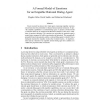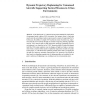AAMAS
2012
Springer
12 years 7 months ago
2012
Springer
Recent research has shown that virtual agents expressing empathic emotions toward users have the potentiality to enhance human-machine interaction. To provide empathic capabilitie...
AAMAS
2012
Springer
12 years 7 months ago
2012
Springer
In this paper we demonstrate how a qualitative framework for decision making can be used to model scenarios from experimental economic studies and we show how our approach explains...
AAMAS
2012
Springer
12 years 7 months ago
2012
Springer
The importance of affect in delivering engaging experiences in entertainment and educational games is well recognized. Yet, current techniques for building affect-aware games are l...
AAMAS
2012
Springer
12 years 7 months ago
2012
Springer
ICCCI
2011
Springer
12 years 11 months ago
2011
Springer
Multiagent reinforcement learning problems are especially difficult because of their dynamism and the size of joint state space. In this paper a new benchmark problem is proposed, ...
ICCCI
2011
Springer
12 years 11 months ago
2011
Springer
This paper presents an exploration of the differences between agent-based and population-based models for trust dynamics. This exploration is based on both a large variety of simu...
HOLOMAS
2011
Springer
12 years 11 months ago
2011
Springer
In the last decade we witnessed an increased demand for employment of unmanned aerial vehicles (UAV) in practise. For instance, there is a growing need to provide surveillance task...
CLIMA
2011
12 years 11 months ago
2011
Multi-agent systems are an increasingly important software paradigm and in many of its applications agents cooperate to achieve a particular goal. This requires the design of effi...
CLIMA
2011
12 years 11 months ago
2011
We propose a logical framework to represent and reason about some important aspects of a theory of institutional action: (1) the distinctions between physical facts and actions and...
CLIMA
2011
2011
Justice Delayed Is Justice Denied: Logics for a Temporal Account of Reparations and Legal Compliance
12 years 11 months ago
In this paper we extend the logic of violation proposed by [14] with time, more precisely, we temporalise that logic. The resulting system allows us to capture many subtleties of t...


